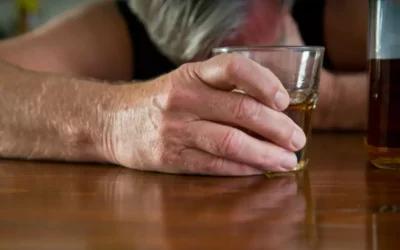Patients report that CNS depressants, such as alcohol, cannabis, opioids, and benzodiazepines acutely improve PTSD symptoms (14). Consistent with this, patients with PTSD report that onset and severity of substance abuse parallel the onset and escalation of PTSD symptoms (14). In addition, clinical evidence suggests that the choice of substances of abuse (CNS depressants versus CNS stimulants) may stem from the particular constellation of PTSD symptoms that patients experience. For example, PTSD patients with alcohol dependence exhibit significantly more arousal symptoms that do PTSD patients with cocaine dependence (10). Yet another study showed that delivering PE and SUD simultaneously did not lead to deterioration of PTSD or SUD symptoms. When looking at individual changes during therapy with change analyses instead of reliance on means, patients who did experience an increase of PTSD or SUD symptoms somewhere during treatment, still improved on these symptoms at the end of treatment [31].
- Given the high rates of dropout reported across studies and treatment types, research is needed to enhance retention among individuals with AUD/PTSD.
- Evidence has accumulated to support a role for CRH in mediating the effects of stress on drug self-administration.
- Transcend, a 12-session manualized group treatment, consists of emphasis on the development of coping skills during the initial 6 sessions, followed by trauma processing conducted in the final 6 sessions (Donovan, Padin-Rivera, Kowaliw, 2001).
- However, please know that you can still take control of your drinking habits and work towards a healthier life.
Objective 2: comparison timing of treatment, regardless of treatment type
In fact, there are treatment options available that can help with both PTSD and alcohol abuse simultaneously, some of which you can access from the comfort of your own home. After experiencing a traumatic event, it’s common to feel differently than you did before. Maybe you even feel the urge to drink to help you forget these stressful memories or help you fall asleep. If you or a loved one is struggling with alcoholism and co-occurring PTSD, recovery is possible.

Objective 1: comparison separate PTSD treatments with SUD treatment only condition at 3-month follow-up
- Lisa joined MAP in its infancy during the early days of the pandemic in 2020, when officials trying to keep the city’s large homeless population safe placed them in hotels and motels.
- In contrast, AA women were more likely than their EA counterparts to experience trauma and to develop PTSD.
- Alcohol behavioral couple therapy uses motivational interviewing techniques and focuses on harm reduction, and behavioral couples therapy for alcoholism and drug abuse emphasizes attaining and maintaining abstinence.
Along this transformative path, you will acquire essential life skills and tools to effectively manage your emotions and confront life’s challenges without relying on alcohol as a crutch. Research reveals that individuals with PTSD are almost four times more likely to develop Alcohol Usage Disorders compared to those without PTSD. Ethics approval PTSD and Alcohol Abuse and consent to participate in the TOPA study was given by the Medical Ethical Committee of the Amsterdam Academic Medical Centre. All information about handling and storage of data and documents are captured in this protocol. Written informed consent from the participants is obtained during the screening process prior to the first assessment.

Causes of complex trauma
Binge drinking is particularly prevalent among veterans with PTSD as compared to other groups. PTSD is a disruptive condition, making it challenging or impossible to live normally. Therapy, especially trauma-focused therapy, medications, support, and coping mechanisms can help you regain control over your life. Krystyl Wright, a licensed clinical social worker and psychotherapist with Diamond Recovery Group based in Los Angeles, said she would prefer to see the money assigned to MAP spent on treatment for more people, especially the most vulnerable, including those without health insurance or stable housing. Despite the drugs’ differences, Olson said they all create neuroplasticity and allow the brain to heal damaged neural circuits, which imaging shows can be shriveled up in patients with addiction, depression and PTSD.
What is Post-Traumatic Stress Disorder?
PTSD Bytes #15: PTSD and alcohol – VA News – VA.gov Home Veterans Affairs
PTSD Bytes #15: PTSD and alcohol – VA News.
Posted: Tue, 23 Aug 2022 07:00:00 GMT [source]
As a result, “if this product were to be approved, we believe the REMS [FDA’s risk evaluation and mitigation strategy] will be necessary to ensure safe use, and to mitigate the risk of serious harm that can result from patient impairment,” said Farchione. “It is the lack of data collection on the subjective effects of MDMA that may have the greatest impact on our regulatory decision-making,” she said. For the question of whether the benefits of MDMA, with FDA’s proposed risk evaluation and mitigation strategy (REMS), outweighs its risks for the treatment of PTSD, the committee voted 1-to-10 against. A expert panel of the Food and Drug Administration (FDA) voted against recommending MDMA-assisted therapy as a treatment for PTSD. “The importance of restoring a healthy brain through an optimal diet is often overlooked, and eating seafood rich in omega-3 fat may be especially helpful,” shares Dr. Umhau. Celebrities are the faces of non-alcoholic brands, mocktail bars are popping up in major cities, and ‘sober curious’ is becoming a household term for those who are re-evaluating their relationship to alcohol.
